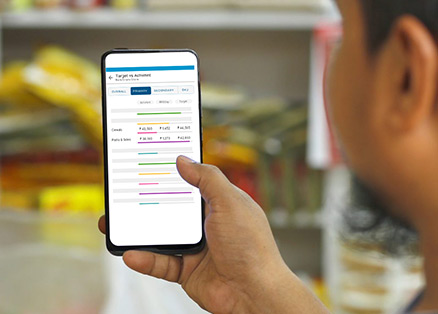Have you ever been inside an FMCG distributorship for Inventory Management System? One of my first visits was at a big distributor of a nationally renowned namkeens brand. For someone who loves snacking, I felt like a kid in a candy shop! That visit was probably one of my earliest experiences in understanding just how critical a distribution partner is for a brand. Super stockists, distributors, and sub-stockists, all form a critical supply chain through which thousands of FMCG products flow forward to the millions of Kirana stores in the country.
Many distributors use one or the other financial accounting software or Inventory Management System to make some sense of their purchase patterns, but the smaller ones rely on their ‘bahi-khaata’ to know how much of their money is stuck in their inventory. Whatever sells, sells, and whatever doesn’t move, gets returned to the company. If their investments are locked in claims or in slow-moving inventory, distributors cannot hope to increase their profitability or make their processes more efficient. So they remain stuck in a rut, unable to find a better way to operate.
Read More: Why is the Indian FMCG distributor disgruntled today?
A CPG Company and its Inventory Management System struggles
Brands to struggle with their fair share of Inventory Management System woes. Once their products reach the distributors or the super stockists, data visibility on the product movement comes to a grinding halt. As a consequence, a company’s Inventory Management System – which should ideally be very scientific – becomes partly based on the historical purchase patterns of their distribution partners and partly on sheer instinct.
A recent study showed that the sector suffers from an inventory accuracy problem.
- The average CPG company has only 63% of its inventory accurately represented in its books. This means that for every INR 100 worth of product a company believes it has on hand, it can only account for INR 63. The other INR 37 is lost somewhere in the system, whether it’s sitting on store shelves or in a warehouse.
- The study also found that the average CPG company has 25 days of inventory on hand, while the optimal level would be 19 days. This means that the CPG sector is losing billions of dollars every year due to inefficiencies in its Inventory Management System.
When it comes to product visibility, brands are not fully aware of which products are selling well in which stores. This information is typically collected by distributors and sent back to brands for analysis, but since data is not collected in real-time it may be outdated by the time it arrives.
As a result, brands may miss opportunities to generate more sales. Sometimes sales team may not have visibility on slow-moving or out-of-stock products, leading to lost sales. To overcome these challenges, brands need to work closely with their distributors and adopt systems that provide real-time visibility into inventory levels and sales data.
By adopting a full-service DMS, companies can take a ‘proactive’ Inventory Management System approach, and forecast future demand.
How does a DMS (Distribution Management System) address challenges in Inventory Management System?
The Distributor Management System is a powerful tool that helps CPG companies address the many challenges in the modern retail landscape. A smart and intuitive DMS system can provide both brands and distributors with unmatched visibility into crucial data such as sales trends, inventory levels, and consumer demand. By allowing brands to access this kind of detailed information, a DMS can help them make more informed, data-driven decisions that can improve their bottom line and better serve their customers.

1. Real-time tracking to get to the root cause of things
A DMS provides real-time sales data to the brand. This makes it much easier for businesses to understand how changing market conditions affect their products, allowing them to make necessary adjustments quickly and efficiently.
For example, one of our customers reported that the numbers for a particular product line, their recently launched bottled fruit juices, were dwindling, and therefore they were experiencing high returns on this product line. Had they not adopted a DMS, they would have continued to think that there was something wrong with the product or that the distributor wasn’t pushing it ahead to the retailers.
In reality, the DMS showed them that the reason the returns were high was because the caps of the juice bottles were slightly loose which was causing the beverage to ferment and have a much shorter shelf life. Because the company had access to this critical information in real time, they were able to recall the later batches, rectify the seals and put them back into the market before expiry.
Watch how Nobel Hygiene became a category leader when millions didn’t know they need it!
2. Right inventory at the right distributor
In addition to providing real-time, on-demand trends, the distributor management system or Inventory Management System also gives businesses valuable insights into inventory patterns across all outlets. By knowing exactly the supply against demand patterns on DMS dashboards, businesses can more easily optimize distribution channels, negotiate better prices with suppliers, and identify opportunities for cost savings.
A DMS also helps a distributor manage his inventory better, because now he knows which products are near expiry, which ones are selling faster, how to push schemes better etc. He is able to maximize his investment and improve relationships with the brand too.
3. Batch-wise aging of stock
A DMS can help keep track of stock movement at the distributor level, ensuring that batches are adequately rotated and that older products are sold first. This is important because it helps prevent wastage and ensures that customers receive the freshest products possible. Most importantly, it can help ensure that distributors communicate any product issues before reaching their expiration date.
4. Inventory reconciliation
One key advantage of a DMS is its flexible approach to inventory reconciliation. At the end of each month, this system helps to reconcile any discrepancies quickly and easily in inventories across various locations or departments. In addition, the system includes an approval mechanism, allowing mid-level managers to review and approve changes before they are implemented. Finally, DMS systems provide users with automated email notifications, which keep them informed of relevant changes throughout the month.
5. Reporting
One of the most valuable features is the ability to create reports. With this system, CPG companies can generate reports on inventory levels, sales figures, and other data. This information can be extremely helpful in planning future production levels and strategies. Additionally, the system can help track distributor performance. This data can identify areas where distributors are not meeting expectations and adjust accordingly.
Read More: Why Do Our Comprehensive Reports Make Our Customers Smile?
Automation and data-driven decisions are the keys to success in today’s marketplace. CPG companies that can utilize these Inventory Management System tools will be able to stay ahead of the competition and continue growing their businesses.
The DMS system provides the ability to do both. It gives brands the power to make decisions based on data rather than guessing. Additionally, it automates several tasks needed to keep inventory levels in check. For CPG companies, having a DMS is essential to success. It provides the tools necessary to make informed decisions and keep inventory levels under control.
To see the power of the DMS yourself, schedule a demo today!
About Post Author
Nikhil Aggarwal
Driven by his passion for growth through automation, Nikhil takes pride in embarking his clients through a transformational journey and helps them be a more resilient, agile, and future-ready brand.
















